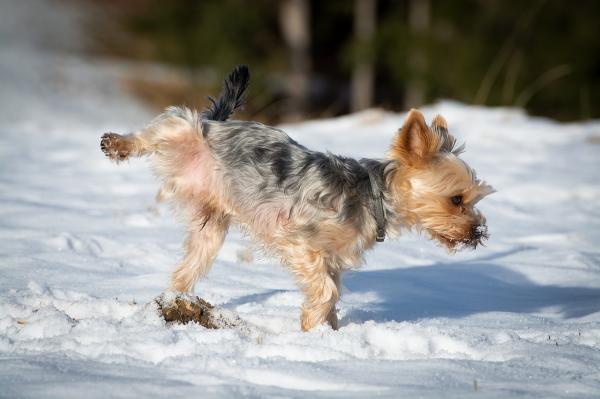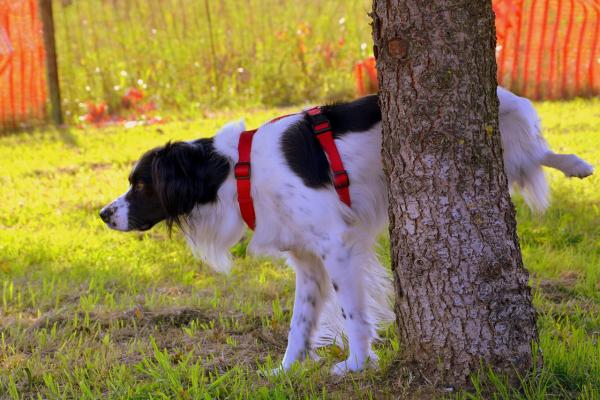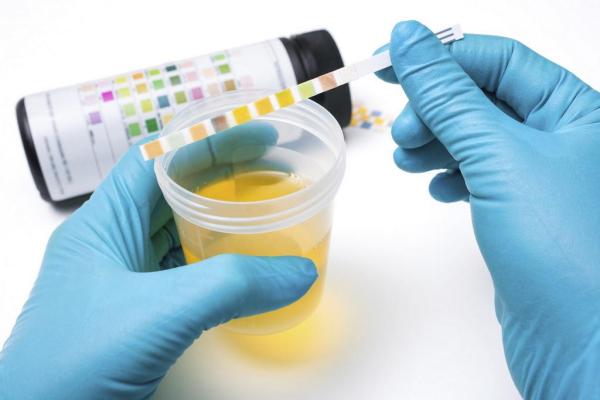Why Is My Dog's Pee So Yellow and Smelly?



See files for Dogs
We can tell a lot about our dog's healthy by the state of their urine. If a dog's urine is dark yellow and smells, it means there is less water in it and it may contain compounds which can indicate disease. Unfortunately, color and odor alone will not confirm the presence of a specific problem, but they will help guide a diagnosis. This diagnosis needs to be carried out by a qualified veterinarian since such as change in a dog's pee can have many causes. They include the presence of parasites, gastrointestinal disorders, trauma or urinary tract infections, among others.
In this AnimalWised article, we ask why is my dog's pee so yellow and smelly? In addition to looking at the causes of dark urine in dogs, we see what treatment options may be available.
Why is my dog's urine dark?
When we go out walking with our dog, it can be easy to get distracted. We should be taking care to ensure we pick up any feces they evacuate, but we might not pay attention to the status of their urine. If walking on grass, muddy terrain or other areas where it is difficult to see the color and consistency of the dog's pee, it is also easy to miss it. However, it is important we try.
The color of a dog's urine is often due to the amount of urea in the urine. The more urea, the more yellow the pee. Urea is a component of urine made of the waste generated by the metabolism of proteins that takes place in the digestive system. The liver and kidneys are the most important in affecting the amount of urea present. The bad smell will also likely be due to increased urea, but it is also possible it contains other substances causing the odor. For example, certain foods change make a dog's pee so smelly.
Depending on the dog's metabolic rate and efficacy of organs, there will be more or less urea present. The more urea present, the darker yellow the pee. A well hydrated dog with low urea levels should have clearer urine which does not smell much. Although food intake can affect odor, a greater amount of urea can also cause the urine to have a stronger smell.
Once we do manage to see the dog's urine color, we might observe that it is darker than normal. Causes of dark yellow urine in dogs can vary from temporary inconsistency to chronic illness. Reasons include:
- Dehydration
- Kidney disease
- Liver disease
- Bladder stones
- Urinary tract infections
- Trauma
- Poisoning
To be help you understand and know what to do, we explain these reasons why is my dog's pee so yellow. We also detail what action needs to be taken and whether it is life threatening. Our article on crystals in your dog's urine further discusses why it is so important to monitor your dog's toilet habits.
Dehydration
When a dog does not drink enough water, they will become dehydrated. However, there are also many other factors which can lead to this problem. Certain diseases can make the dog dehydrated, especially if they cause a lot of vomiting and diarrhea. This is because both these symptoms remove a lot of fluid from the body. Certain diseases may not allow the body to absorb much water in the first place.
Climate and behavior can also affect hydration of dogs. If the dog drinks water in the cool of the morning, but the environment becomes much hotter later on, their body will need more water to sustain itself. Similarly, when dogs get excited and exercise a lot, they may neglect to drink sufficient water.
Finally, we may simply not be providing enough water for them. While we will always need to limit their food intake to a healthy amount, most dogs will require 24 access to fresh and clean water.
All of these reasons can cause the dog's pee to be so yellow and smelly. This is because there is less water to dilute the urea and other substances in the urine. Providing plenty of water and the opportunity to drink it should be enough. However, if they appear to be drinking enough water and still have dark yellow urine, then we should take them to the veterinarian to diagnose the problem.
Sometimes a dog will simply not drink enough water. Our article on why my dog isn't drinking water will provide reasons and what we can do to encourage them to drink more.

Kidney disease
Unfortunately, renal failure in dogs can be asymptomatic for a long time before we are able to notice something is wrong. This is why it is so important we notice changes such as darker urine or uncommon odors. Kidney disease is usually associated with age. Since the dog is affected by the deterioration of age, vital organs will inevitably lose some function. However, poor diet, lack of exercise and other factors contribute to your dog's pee being so yellow.
When their kidneys cannot function effectively, the dog will still be able to pass urine (a lack of urine is likely a bladder issue). However, there will often be more urea, making the colorof the pee darker yellow. It can also give it a stronger smell.
Unfortunately, damage to the kidneys cannot be reversed. It can be slowed and we can maintain optimal health, but if the kidneys are sufficiently damaged they will suffer renal failure which is fatal. If the kidneys are still able to function, the veterinarian will likely start by flushing them with fluid. This depends on the underlying cause. A change to a diet for dogs with kidney failure will be required, as well as other lifestyle changes to limit the effects.
Liver disease
The causes and treatment of liver failure in dogs is similar to kidney disease. Age and lifestyle are significant factors, but so are genetics. It is possible the dog will inherit genetic problems which result in the liver not functioning properly. Treatment will be similar and it is also not possible to reverse the damage.
Bladder stones
Although bladder stones are often the result of kidney failure, we can isolate them as a problem which causes darkened urine in dogs. Bladder stones are caused by dehydration, metabolic disease, poor diet and even infections. However, they can also cause more than just dark yellow pee that smells.
If the bladder stones are large enough, they can cause blockages in ducts of the urinary tract. A rupture here can be fatal since it can lead to internal bleeding and blood infections. Also, some breeds are more prone to uroliths (bladder and kidney stones) due to a genetic predisposition.
Getting rid of kidney stones is not always easy and depends on many factors, not least their size. Some dogs can pass the stones naturally, although this can be very painful. If we see that the dog is peeing a little blood afterwards, it is possible that the stones have done some internal damage. If they cannot be passed naturally, the dog will need to undergo surgery.
Treatment of the underlying cause of canine bladder stones is also important. For example, if the dog has a metabolic disease, it will need to be managed.

Urinary tract infections
As you can see from previous causes of dark yellow and foul smelling urine in dogs, many are linked. Urinary tract infections (UTIs) in dogs are no exception. UTIs can cause bladder stones and even organ failure if the infection spreads. They can be chronic or acute, but there are many different factors. Hygiene is an important one.
The bacterium Escherichia coli is often the cause, something which can come from other parts of the digestive tract. E. coli infections can cause UTIs which will often lead to cystitis in dogs, i.e. an infection of the bladder. Treatment will usually come in the form of antibiotic treatment. They will also need plenty of hydration and the veterinarian may provide fluid therapy to help the process.
Trauma
One of the most worrying reasons why your dog's pee is dark yellow and smells bad is due to physical trauma. When dogs are hit by cars, fall from a height or incur similar trauma, they may not always show obvious symptoms of damage. Some may start to limp on their back leg due to a fracture. But if the problem is internal, dark yellow urine may be one of the first signs of internal bleeding.
When the dog pees a little blood it is not always easy to tell. If the problem is in the lower digestive tract or there is a cut near their urethra, the blood will be fresh. If trauma occurs internally, the blood may enter the urinary tract which causes the urine to darken. It will not look red, but mixing with the urea the urine will not only appear a darker yellow, but a rusty or brown color. This is why it is vital to look at the color of their pee.
If you suspect your dog has internal bleeding due to trauma or any other issue, take them to the veterinarian immediately. They can diagnose the problem and will treat it accordingly, most likely with surgery.
Poisoning
Whether due to eating spoiled food, a poisonous substance or even cleaning products, dog poisoning is on a spectrum. Some cases may have a little vomiting and dark yellow urine, but will pass on its own. Others will put the dog in toxic shock and can be fatal. You will have to take the dog to the veterinarian for emergency treatment regardless. Early symptoms may not seem acute, but it can develop.

How to take a dog's urine sample
If you suspect your dog has any of the above causes of darkened urine, but want have no evidence, you may need to collect some urine. Since you may not walk on a surface which is clear enough to see the color of the urine, collecting it allows you to see better.
A professional veterinarian will be able to take a proper urine sample. While it will not likely be used as a diagnostic test, they can use a catheter in certain situations. More likely, they will wait until the dog needs to urinate and they will use a medical receptacle to collect the sample.
You can do the same at home. All you will need is a suitable clear container, a plastic cup or jar is useful (glass is breakable and may not be ideal). To collect the urine sample:
- Take a suitable clear container.
- Go outside with the dog on their normal walk when they would urinate.
- Follow the dog until they motion to urinate.
- Hold the container over their urethra and be careful not to get any on your hands.
You can look at the color of the dog's urine through the light. You may take it to the veterinarian if they ask for it, but they will probably take their own sample.
Since the dog will need to be trained how to urinate outside first, our video on how to educate a puppy might help you see how it is done:

This article is purely informative. AnimalWised does not have the authority to prescribe any veterinary treatment or create a diagnosis. We invite you to take your pet to the veterinarian if they are suffering from any condition or pain.
If you want to read similar articles to Why Is My Dog's Pee So Yellow and Smelly?, we recommend you visit our Other health problems category.








